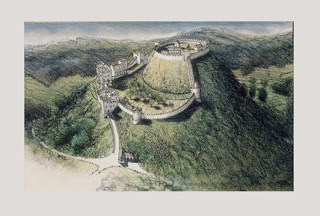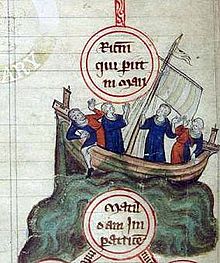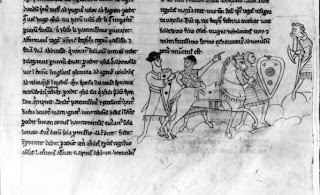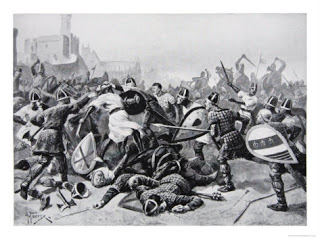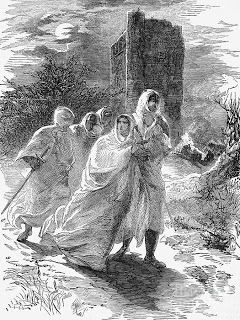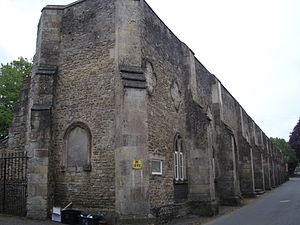William Mohun
|
The Anarchy
William Mohun, William II's father was the first generation of the family of Mohun to own Dunster Castle after the conquest of England. The arrival of the Normans saw him build his timber motte and bailey castle on the lands he received for services rendered.
William (II) was the most prominent of all the Mohuns, he was a contemporary of Henry I and Stephen and a supporter of the Empress Matilda.
Born around the beginning of the 12th century William was more than likely the third and only surviving son on the death of his father. His marriage to Agnes de Gant, the daughter or sister of Walter de Gant of Lincoln, took place around 1120. Dunster Castle was still the Mohuns ‘caput baronie’ and it was here that Agnes may have given birth to their six children, the exact order of their births is not known.
Their eldest child was probably Ralph/Robert who gave land at Avelham to Dunster Church, there is no mention of his death but it highly likely that he predeceased his father. Henry was born c1125 and seems to have inherited his mother's estates of Whichford. He was still living in 1162 as he paid a Knights fee for lands held in Hampshire, he had died by 1167. Ivan was born two years later nothing is known of him. Richard was born around 1131 and was said to have been a clerk and benefited financially from lands held of his father in Normandy. There is a mention of a daughter named Alice, but of her I can find nothing.
William and Agnes son and heir was their son William (III) of whom we will speak of in another chapter.
William was most certainly a fairly important man in the court of Henry I, the first reference to William can be found in a charter dated 1131 which states that he was in attendance to Henry I at a meeting of the Council of Northampton. At this time Williams life may have been relatively stable but the seeds of William’s involvement in the troubles between Henry's daughter and her cousin and his own eventual downfall were sown eleven years earlier in 1120.
On the 25th November 1120, the year of William marriage to Agnes, William Adelin, King Henry I’s only son and heir had perished when the ship in which he was travelling sank in the English Channel. Following this tragedy, Henry made his daughter Matilda his heir when she married Geoffrey Plantagenet, Count of Anjou. In support for Matilda, Henry made the leading barons of the realm, including his nephew Stephen of Blois, swear an oath to accept Matilda as his rightful heir, these oaths were taken in 1127, 1128 and 1131. The Kings decision was not popular for two reasons, firstly, Matilda was a woman and secondly, Anjou was the sworn enemy of the Normandy. When Henry I died in 1135 disregarding the oaths previously taken, Stephen traveled from Boulogne to England’s capital and was crowned king, in justification of this Stephen stated that Henry, on his deathbed, had had a change of heart and named him as his successor, the fact that he was not present at his uncles demise did not deter him.
To support his claim Stephen called one Hugh Bigod, who stated that he was witness to Henry’s change of mind, not surprisingly Stephen did not summon those men who actually attended the king on his death, an archbishop, a bishop and four earls. Ulger, Bishop of Angers who supported Geoffrey Plantagenet and subsequently Matilda too was highly suspicious and later put it to another who also claimed to be at the kings death.
‘As for your statement that the King changed his mind, it is proved false by those who were present at the Kings death, neither you nor Hugh could
possibly know his last request, because neither of you were there”
R. H. C. Davis in his book ‘King Stephen’ suggests that Bigod and others were present when the King was dying but not present at his death and therefore not witness to a 'last minute change of heart' as they had left to inform Stephen of the news. At this time Matilda was in Anjou with her husband, on hearing that Stephen had usurped the throne she left there for Normandy and in 1139 she set out, with her half brother, Robert of Gloucester, for England.
In these early months of Stephen’s reign Mohun spent much of his time attending to his West Country manors as there is no evidence that Mohun ever attended King Stephen's court. The king had gained the support of the majority of the barons as well as Pope Innocent II. The first few years of his reign were peaceful, but he was troubled by the Welsh, King David I of Scotland, and Baldwin de Redvers, Earl of Devon. By 1137 Stephens government was becoming unsettled and by 1139 Stephen had successfully put down the first of two West Country rebellions whose leaders were Robert de Bampton and the above named Baldwin de Redvers. On their defeat, Stephen had given the lands of Bampton to Henry de Tracy and driven Redvers out of the country. Mohun and the remaining barons who were loyal to Henry I transferred their support to Matilda whose arrival at Arundell with Robert of Gloucester proved to be the catalyst for a second wave of rebellions by the West Country barons. Mohun was among five or six other west country men to take up arms against Stephen, but Stephen quickly saw to it that some of these men were punished and he proceeded to capture these barons strongholds one by one.
For his part in the above named uprising, William Mohun has gone down in history as a man both hated and feared by the population of the West Country, most of Williams ‘bad press’ appears in the ‘Gesta Stephani’ or ‘The Acts of Stephen’ a 12th century study of English history. According to this work, these West Country rebels ravaged the country in order to obstruct the king.
Below is a section of the Gesta Stephani relating to William Mohun,
“At the time, William de Moiun, a man not only of the highest rank but also of illustrious lineage, raised a mighty revolt against the King, and, collecting some bands of horsemen and footmen, at his fortress, which he had placed in a fair and impregnable position by the sea-shore, began to overrun all that part of England in warlike manner, sweeping like a whirlwind. At all places and at all times, laying aside has loyalty, he set himself to work his cruel will, to subdue by violence not only his neighbours but others living afar off, to oppress with robbery and pillage, with fire and sword, any who resisted, and mercilessly to subject all wealthy persons whom he met to chains and tortures. By doing so, he changed a realm of peace and quiet, of joy and merriment, into a scene of strife and rebellion, weeping and lamentation. When in course of time these doings were made known to the king, he gathered his adherents together in a mighty host and marched with all speed to put an end to Williams savagery. But when he came to a holt before the entrance of the castle and saw the impregnable defences of the place, inaccessible on the one side where it was washed by the tide and very strongly fortified on the other by towers and walls, by rampant and outworks, he gave up all hope of carrying it by siege, and, taking wiser counsels, blockaded the castle in full view of the enemy, so that he might the better hold them in check and occupy the neighbouring country in security. He also gave orders to Henry de Tracy, a skilled soldier, oft approved in the hazards of war, that acting in his stead, because he was called away to other business, he should with all promptitude and diligence bestir himself against the enemy. Henry therefore, in the Kings absence, set forth from Barnstaple, a town belonging to him and enjoying privileges granted to him by the king, and made vigorous and determined attacks on his foes, so that he not only restrained their wonted sallies and the unbridled, marauding raids in the neighbourhood, but also captured a hundred and four horsemen in on cavalry encounter. At length, he so reduced and humbled William that he was able to abandon further hostilities against him and to leave the country more peaceful and free from such disturbance”
Of course, history is written by the victors and in the case of William Mohun he has become the 'scourge of the west.’ if Matilda had been successful in her quest he most certainly would have been seen the ‘saviour of the west’.
It would appear that William did not venture far from Somerset after 1139 and is not mentioned in any minor skirmishes that involved the West Country or Robert of Gloucester, it seems that he preferred to tend to the needs of his lands and family, but Matilda’s quest continued. On the 2nd February 1141, Ranulf, Earl of Chester a supporter of Matilda, seized control of Lincoln Castle and fortified it against attack, the people of Lincoln appealed to the King for help.
Stephen responded, riding to Lincoln at the head of his army, it is said that he placed his bowmen and siege machines on the west front of Lincoln Cathedral, which faces the castle across Castle Hill, but soon after the arrival of Stephen, Robert of Gloucester came to Matilda’s aid.
To support his claim Stephen called one Hugh Bigod, who stated that he was witness to Henry’s change of mind, not surprisingly Stephen did not summon those men who actually attended the king on his death, an archbishop, a bishop and four earls. Ulger, Bishop of Angers who supported Geoffrey Plantagenet and subsequently Matilda too was highly suspicious and later put it to another who also claimed to be at the kings death.
‘As for your statement that the King changed his mind, it is proved false by those who were present at the Kings death, neither you nor Hugh could
possibly know his last request, because neither of you were there”
R. H. C. Davis in his book ‘King Stephen’ suggests that Bigod and others were present when the King was dying but not present at his death and therefore not witness to a 'last minute change of heart' as they had left to inform Stephen of the news. At this time Matilda was in Anjou with her husband, on hearing that Stephen had usurped the throne she left there for Normandy and in 1139 she set out, with her half brother, Robert of Gloucester, for England.
In these early months of Stephen’s reign Mohun spent much of his time attending to his West Country manors as there is no evidence that Mohun ever attended King Stephen's court. The king had gained the support of the majority of the barons as well as Pope Innocent II. The first few years of his reign were peaceful, but he was troubled by the Welsh, King David I of Scotland, and Baldwin de Redvers, Earl of Devon. By 1137 Stephens government was becoming unsettled and by 1139 Stephen had successfully put down the first of two West Country rebellions whose leaders were Robert de Bampton and the above named Baldwin de Redvers. On their defeat, Stephen had given the lands of Bampton to Henry de Tracy and driven Redvers out of the country. Mohun and the remaining barons who were loyal to Henry I transferred their support to Matilda whose arrival at Arundell with Robert of Gloucester proved to be the catalyst for a second wave of rebellions by the West Country barons. Mohun was among five or six other west country men to take up arms against Stephen, but Stephen quickly saw to it that some of these men were punished and he proceeded to capture these barons strongholds one by one.
For his part in the above named uprising, William Mohun has gone down in history as a man both hated and feared by the population of the West Country, most of Williams ‘bad press’ appears in the ‘Gesta Stephani’ or ‘The Acts of Stephen’ a 12th century study of English history. According to this work, these West Country rebels ravaged the country in order to obstruct the king.
Below is a section of the Gesta Stephani relating to William Mohun,
“At the time, William de Moiun, a man not only of the highest rank but also of illustrious lineage, raised a mighty revolt against the King, and, collecting some bands of horsemen and footmen, at his fortress, which he had placed in a fair and impregnable position by the sea-shore, began to overrun all that part of England in warlike manner, sweeping like a whirlwind. At all places and at all times, laying aside has loyalty, he set himself to work his cruel will, to subdue by violence not only his neighbours but others living afar off, to oppress with robbery and pillage, with fire and sword, any who resisted, and mercilessly to subject all wealthy persons whom he met to chains and tortures. By doing so, he changed a realm of peace and quiet, of joy and merriment, into a scene of strife and rebellion, weeping and lamentation. When in course of time these doings were made known to the king, he gathered his adherents together in a mighty host and marched with all speed to put an end to Williams savagery. But when he came to a holt before the entrance of the castle and saw the impregnable defences of the place, inaccessible on the one side where it was washed by the tide and very strongly fortified on the other by towers and walls, by rampant and outworks, he gave up all hope of carrying it by siege, and, taking wiser counsels, blockaded the castle in full view of the enemy, so that he might the better hold them in check and occupy the neighbouring country in security. He also gave orders to Henry de Tracy, a skilled soldier, oft approved in the hazards of war, that acting in his stead, because he was called away to other business, he should with all promptitude and diligence bestir himself against the enemy. Henry therefore, in the Kings absence, set forth from Barnstaple, a town belonging to him and enjoying privileges granted to him by the king, and made vigorous and determined attacks on his foes, so that he not only restrained their wonted sallies and the unbridled, marauding raids in the neighbourhood, but also captured a hundred and four horsemen in on cavalry encounter. At length, he so reduced and humbled William that he was able to abandon further hostilities against him and to leave the country more peaceful and free from such disturbance”
Of course, history is written by the victors and in the case of William Mohun he has become the 'scourge of the west.’ if Matilda had been successful in her quest he most certainly would have been seen the ‘saviour of the west’.
It would appear that William did not venture far from Somerset after 1139 and is not mentioned in any minor skirmishes that involved the West Country or Robert of Gloucester, it seems that he preferred to tend to the needs of his lands and family, but Matilda’s quest continued. On the 2nd February 1141, Ranulf, Earl of Chester a supporter of Matilda, seized control of Lincoln Castle and fortified it against attack, the people of Lincoln appealed to the King for help.
Stephen responded, riding to Lincoln at the head of his army, it is said that he placed his bowmen and siege machines on the west front of Lincoln Cathedral, which faces the castle across Castle Hill, but soon after the arrival of Stephen, Robert of Gloucester came to Matilda’s aid.
The citizens of Lincoln joined Stephen's forces against Gloucester's army, but the royal army was overwhelmed. One of the Lincoln men handed Stephen a Danish battleaxe, he fought valiantly but his cause was hopeless, and he was captured.
The city itself suffered for its support of King Stephen many of its inhabitants killed by the victorious army under Gloucester. The King was imprisoned at Bristol. William, as mentioned, did not fight in the Battle of Lincoln along side Robert of Gloucester but he was rewarded for his support with the title of Earl by Matilda towards the end of 1141. Matilda’s advantage lasted only a few months, she marched on London under the title of Lady of the English and the city was ready with their support. However, she refused the people’s request to have their taxes halved and on arrival in London she found the gates shut, the civil war reignited on 24 June 1141. In the four months of Matilda’s short reign William is not mentioned as being part of her entourage.
By November, Stephen was free, having been exchanged for the captured Robert of Gloucester. A year after Stephen regained his throne the tables were turned when Matilda was besieged at Oxford but escaped to Wallingford, supposedly by fleeing across the snow-covered land in a white cape. In 1141 she had escaped from her guards at Devizes in a similarly clever manner, by disguising herself as a corpse and being carried out for burial and by 1148 Matilda and her son Henry returned to Normandy following the death of Robert of Gloucester.
William Mohun must have been anxiously awaiting the retribution of the king, Stephen had become aware of criticisms of his leniency with rebels and according to the Chronicle of John of Worcester he ‘hanged five men of rank.’ With most of the main players already dead, Stephen job now was to deal with the remaining few still alive. The rest of the traitors were rounded up for execution, but instead he seemed to prefer to make a series of arrests which gave him control of vital castles but this alienated his followers. William Mohun, it seems, was not punished for his support of Matilda, by the end of 1143 Mohun had deserted her cause, incurring major disgrace for his actions mentioned in the Gesta Stephani.
William died in obscurity, a direct result of the loss of 104 of his knights to Henry de Tracy. As Mohun’s disgrace left the next generation to suffer the consequences of his actions the De Tracy family were, for a generation at least, rising stars, but like the Mohuns the de Tracy's too fell out of royal favour, William de Tracy’s was one of the four men who had heard Henry II’s outburst "Will no one rid me of this turbulent priest?’ and then had gone on to murder Thomas Becket at Canterbury Cathedral, as a result the De Tracy lands in Devon were forfeited to the crown.
There is no record of William after 1143, it is probable that he died around 1155, he was buried at the Priory of Bruton.
